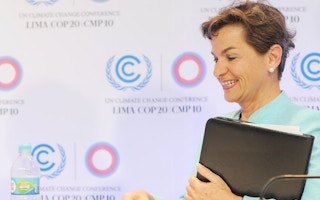For three years leading up to the last significant United Nations climate summit, at Copenhagen in 2009, I was the strategic director of the Copenhagen Climate Council. The purpose of this group – which included chief executives of major global businesses headquartered in China, Europe, and the United States, as well as policy experts, scientists and other leading academics – was to shed light on the importance of reaching a global climate agreement, and to define what that agreement should include.
Copenhagen looked like having the right ingredients to deliver such a deal – the “Goldilocks’ porridge” of international climate talks, if you will. It was convened in the right place (a European capital), at the right time (after public and elite awareness had been raised, by the Intergovernmental Panel on Climate Change’s Fourth Assessment Report and by catastrophes such as Hurricane Katrina and the 2003 European heatwave), and involved the right participants (heads of state able to make major economic, energy and trade policy decisions).
And yet despite all this, the meeting failed to achieve anything more than a flimsy two pages of text – the Copenhagen Accord – which committed signatories to nothing more than agreeing to agree in the future and to account for existing policy commitments. Copenhagen has become shorthand for the world’s failure to get its act together and address the climate problem properly.
I still recall how deflated I felt on leaving the enormous Bella Centre on the outskirts of the city, on the freezing December Saturday after the talks ended. Looking out of the window of the modern, driverless electric subway train quietly taking me back to the city, I saw a group of young children playing in the snow. They didn’t know it, but they had been let down by the people in the vast conference centre. I thought it would be years before anything like the opportunity represented by Copenhagen would occur again.
Reasons to be cheerful
More than five years have passed, and I am more optimistic. With eight months to go until the Paris talks, there are solid reasons to be more than hopeful.
First, there is now an awareness (born of experience more than analysis) that the problem is not some future risk, but a real and present danger. No longer does one have to undertake much research to put forward evidence of a more unstable, warmer climate. It is continuous. Last year was the world’s hottest on record, and the past month has brought us Cyclone Pam, one of the strongest cyclones ever recorded, and seen California spend another US$1 billion on trying to tackle its drought.
No single event can be directly attributed to human-induced climate change, but their occurrence and severity are utterly consistent with a stream of climate models and predictions going back to the 1980s.
China, Brazil, Indonesia and other rapidly developing countries no longer need convincing of the need to make big emissions cuts. It is their experience of the costs of climate events that have already occurred which has helped to break down the divisions between “developing” and “developed” nations. They all see the benefits in a globally agreed deal that they can contribute to through adopting a low-carbon growth path.
The Stern Review on the Economics of Climate Change showed that the trade-offs between high- and low-carbon economic growth path are meaningless: to be sustainable, economic growth must be low-carbon. Nine years after the review, and with abundant work revealing the tangible benefits of transforming the global economy while weaning ourselves off fossils fuels, the debates are now less about the need to reduce emissions at scale, and more about how to do it most effectively.
Boosting security
“
There is a growing, pragmatic appreciation of the relationship between effective climate policy and efforts to reduce further long-term environmental, societal, economic and security risks.
The second reason for optimism is that, unlike at Copenhagen, many countries see an effective climate agreement as more than an end in itself. It is also a vital means to address other global challenges. There is a growing, pragmatic appreciation of the relationship between effective climate policy and efforts to reduce further long-term environmental, societal, economic and security risks. Human movements from flooding in Bangladesh; water scarcity in Africa and the Middle East, and sea level rise affecting major cities are all scenarios that will only intensify existing tensions and problems.
US president Barack Obama’s new National Security Strategy has listed climate change as a security risk on a par with factors like a catastrophic attack on the United States, or the proliferation of weapons of mass destruction. The Pentagon’s positioning of the issue of emissions reductions as crucial to future health and security greatly enhances the likelihood of a global diplomatic agreement.
A third reason for optimism is one man: the President of the United States. It isn’t fashionable to fete our politicians, but Obama, in the months leading up to the meeting in Paris, is a real source of hope. In his second term, he has already expended a huge amount of political capital on the climate problem. Through his lobbying of other leaders and the bilateral agreements with China and India, the president and his negotiating team have effectively been working on a Paris outcome for more than a year.
One shouldn’t be cynical about legacy being a powerful driver for a leader. It is nothing but auspicious that the Paris meeting represents a moment when the US president has the potential to make an international climate agreement one of his lasting achievements.
In a bind
Fourth, since Copenhagen the United Nations has come to appreciate that there must be alternatives to a legally binding agreement being the sole criterion for judging the meeting a success. For a negotiation to be meaningful and effective, it needs greater definition than agreeing sentences, targets and timetables. They are needed, but in and of themselves, too abstract.
Over the past year the UN has focused on deforestation as a key area where real progress can be made, and last September it secured the New York Declaration on Forests. This statement was agreed by key countries and an impressive list of global environment groups and businesses with the power to shift their supply chains away from the products and processes that drive deforestation. Of course, such statements can’t solve the problem of carbon emissions from deforestation, but it gives a wide coalition of people the ability to influence the issue and take the negotiations out of the technical speak that only negotiators understand.
A final reason for optimism is simply the calibre and experience of the key players. So woeful was the Danish government’s management of the Copenhagen meeting that the conference president, Connie Hedegaard, was replaced by her Prime Minister halfway through the talks.
This won’t happen in Paris. In Laurent Fabius, the current French foreign minister and former Prime Minister, the meeting will be led by someone with unparalleled expertise in international negotiations and a brain the size of a basketball.
Another key role at Copenhagen – executive secretary the UN Framework Convention on Climate Change (UNFCCC), under whose auspices the negotiations are conducted – was filled by the dour Dutch diplomat Yvo de Boer. He seemed overwhelmed by the job; photographs of his frowns, eye rubbing and generally torpid body language became an enduring image of the meeting.
With the feisty, dynamic Christiana Figueres now in the job, not only will there be no yawning from the stage, but she now heads an organisation that has learned the hard lessons from the Copenhagen circus.
Of course, none of these factors guarantees a successful outcome in Paris. But I believe each makes it more likely. The crucial question now is what an adequate climate agreement actually looks like, and how history will judge the Paris summit’s ability to deliver it.
![]()
Nick Rowley is professor, Sydney Democracy Network at University of Sydney. This article was originally published on The Conversation.









